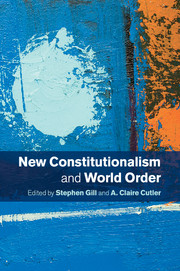Book contents
- Frontmatter
- Contents
- List of Figures
- List of Contributors
- Acknowledgements
- List of Acronyms
- 1 New constitutionalism and world order
- Part I Concepts
- Part II Genealogy, origins and world order
- Part III Multilevel governance and neo-liberalization
- Part IV Trade, investment and taxation
- Part V Social reproduction, welfare and ecology
- Part VI Globalization from below and prospects for a just new constitutionalism
- Glossary
- Appendix
- Bibliography
- Index
Part VI - Globalization from below and prospects for a just new constitutionalism
Published online by Cambridge University Press: 05 February 2014
- Frontmatter
- Contents
- List of Figures
- List of Contributors
- Acknowledgements
- List of Acronyms
- 1 New constitutionalism and world order
- Part I Concepts
- Part II Genealogy, origins and world order
- Part III Multilevel governance and neo-liberalization
- Part IV Trade, investment and taxation
- Part V Social reproduction, welfare and ecology
- Part VI Globalization from below and prospects for a just new constitutionalism
- Glossary
- Appendix
- Bibliography
- Index
Summary
Globalization from below and prospects for a just new constitutionalism
Part VI seeks to highlight some potential for moving beyond new constitutionalism and to develop alternative or insurgent forms of constitutionalism in order to advance a more just, democratic and progressive world order. The main themes involve:
Constitutionalism as critique or critical perspectives on the new constitutionalism.
The importance of linking the critical approach to ‘globalization-from-below’ scholarship to challenge and transcend the epistemological dominance of neo-liberalism.
The political tensions and ethical contradictions between the constitution of the global political economy and the geopolitical practices and institutions that underpin and extend it.
The need to transform the double standards, geopolitical contradictions and normative inadequacies of the new constitutional global order by means of a ‘just new constitutionalism’, for example as anchored in the ‘radical promise’ of the UN Declaration of Human Rights.
Gavin Anderson in Chapter 17 seeks to demonstrate how critical perspectives can generate new knowledge in constitutional theory. In doing so he draws special attention to the operation of constitutional discourse at two different levels. At one level constitutional discourse develops the foundational procedures governing the exercise of political power. At a second level, ‘over the rules, it plays the crucial role of setting parameters for ‘how politics is contested’ as well as ‘what is deemed politically contestable’. That is, as Anderson notes, ‘constitutional discourse is always more than the rules that it generates or legitimates, performing also a crucial “framing function”’. He argues that constitutionalism as critique allows for reconnecting this framing function of constitutional discourse to the power dynamics that inl uence our ability to imagine alternative, insurgent or, in his words, ‘post-imperial’ forms of constitutionalism.
- Type
- Chapter
- Information
- New Constitutionalism and World Order , pp. 277 - 280Publisher: Cambridge University PressPrint publication year: 2014



